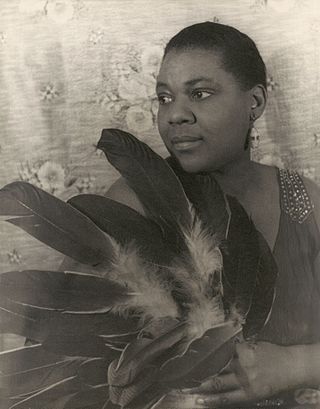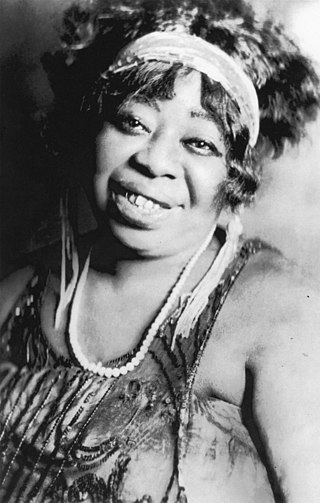Related Research Articles

Bessie Smith was an African-American blues singer widely renowned during the Jazz Age. Nicknamed the "Empress of the Blues", she was the most popular female blues singer of the 1930s. Inducted into the Rock and Roll Hall of Fame in 1989, she is often regarded as one of the greatest singers of her era and was a major influence on fellow blues singers, as well as jazz vocalists.

Gertrude "Ma" Rainey was an American blues singer and influential early-blues recording artist. Dubbed the "Mother of the Blues", she bridged earlier vaudeville and the authentic expression of southern blues, influencing a generation of blues singers. Rainey was known for her powerful vocal abilities, energetic disposition, majestic phrasing, and a "moaning" style of singing. Her qualities are present and most evident in her early recordings "Bo-Weevil Blues" and "Moonshine Blues".

Nina Simone was an American singer, songwriter, pianist, composer, arranger and civil rights activist. Her music spanned styles including classical, folk, gospel, blues, jazz, R&B, and pop. In 2023 Rolling Stone ranked Simone at No. 21 on their list of the 200 Greatest Singers of All Time.
"My Baby Just Cares for Me" is a jazz standard written by Walter Donaldson with lyrics by Gus Kahn. Written for the film version of the musical comedy Whoopee! (1930), the song became a signature tune for Eddie Cantor who sang it in the movie. A stylized version of the song by American singer and songwriter Nina Simone, recorded in 1957, was a top 10 hit in the United Kingdom after it was used in a 1987 perfume commercial and resulted in a renaissance for Simone.

Nina Simone was a remarkable American singer, songwriter, pianist and civil rights activist. Her unique blend of jazz, blues, gospel, and classical music, coupled with her powerful voice and poignant lyrics, left an indelible mark on the world of music.

Sings the Blues is an album by singer/pianist/songwriter Nina Simone. This was Simone's first album for RCA Records after previously recording for Colpix Records and Philips Records. The album was also reissued in 2006 with bonus tracks, and re-packaged in 1991 by RCA/Novus as a 17-track compilation under the title The Blues.

Here Comes the Sun is the thirteenth studio album by American singer Nina Simone, consisting of cover versions of songs by pop and rock musicians, released by RCA in April 1971.
"Little Girl Blue" is a popular song with music by Richard Rodgers and lyrics by Lorenz Hart, published in 1935. The song was introduced by Gloria Grafton in the Broadway musical Jumbo.
"Ain't Nobody's Business" is a 1920s blues song that became one of the first blues standards. It was published in 1922 by Porter Grainger and Everett Robbins. The song features a lyrical theme of freedom of choice and a vaudeville jazz–style musical arrangement. It was first recorded, as "'Tain't Nobody's Biz-ness if I Do", in 1922 by Anna Meyers, backed by the Original Memphis Five.
"Big Ten Inch Record", also known as "Big Ten-Inch ", is a rhythm and blues song written by Fred Weismantel. It was first recorded in 1952 by Bull Moose Jackson and released by King Records, originally on 10" vinyl, the most popular format at the time. The song was later covered by Aerosmith and released as part of the 1975 album, Toys in the Attic. It has been rated as one of the best double entendre songs of all time.

"Nobody Knows You When You're Down and Out" is a blues standard written by pianist Jimmie Cox in 1923 and originally performed in a Vaudeville-blues style. The lyrics in the popular 1929 recording by Bessie Smith are told from the point of view of somebody who was once wealthy during the Prohibition era and reflect on the fleeting nature of material wealth and the friendships that come and go with it. Since her 1929 recording, the song has been interpreted by numerous musicians in a variety of styles.

The Soul of Nina Simone is a DualDisc, which contains a CD on one side of the disc and a DVD on the other containing footage from her appearance at 1969's Harlem Cultural Festival.
Alice Leslie Carter was an American classic female blues singer, active as a recording artist in the early 1920s. Her best-known tracks are "Decatur Street Blues" and "Aunt Hagar's Children Blues". She was a contemporary of the better-known recording artists Ma Rainey, Bessie Smith, Clara Smith, Victoria Spivey, Sippie Wallace, and Bertha "Chippie" Hill. Little is known of her life outside music.
Jean DuShon was an African American jazz and R&B singer, and stage actor. She was best known for her recordings in the 1960s, including the first released recording of the song "For Once in My Life" in 1966, although many had not heard her version, and assumed the original recording was by Stevie Wonder
"Big Long Slidin' Thing" is a 1954 rhythm and blues song written by Leroy Kirkland and Mamie Thomas, sung by Dinah Washington, and arranged by Quincy Jones. It has been covered by a number of different artists, and has been rated as one of the best double entendre songs of all time.
"It Ain't the Meat (It's the Motion)", also known as "It Ain't the Meat", is a rhythm and blues song written by Henry Glover and Syd Nathan. It was first recorded in 1951 by the Swallows and released by King Records. It was later covered by Maria Muldaur in a 1974 version that has been credited with popularizing the song's title phrase as a proverb, referring to the importance of a man's sexual technique over the size of his penis.
"Keep On Churnin' (Till the Butter Comes)" is a rhythm and blues song written by Henry Glover, Jester Hairston, and Lois Mann. It was first recorded in 1952 by Wynonie Harris, with backing from the Todd Rhodes Orchestra, and released by King Records. The song was also recorded by Hank Ballard and the Midnighters. It has been rated as one of the best double entendre songs of all time.
Ina Forsman is a Finnish blues and blues rock singer-songwriter. She has been involved in the recording of six albums since 2013.

"Gimme a Pigfoot" is a 1933 song written by Wesley Wilson, probably with Coot Grant, his wife, though she is not usually credited on record labels. It was first recorded by Bessie Smith, and versions have been released by many other artists. It is sometimes listed as "Gimme a Pigfoot ".

Bitter Sweet Blues is an album by the American musician Gaye Adegbalola, released in 1999. Recorded for Alligator Records, it was her first solo album.
References
- ↑ "Columbia matrix W151883. Need a little sugar in my bowl / Bessie Smith". Discography of American Historical Recordings. University of California, Santa Barbara . Retrieved November 15, 2020.
- ↑ John Clark (2017). Experiencing Bessie Smith: A Listener's Companion. Rowman & Littlefield. p. 112. ISBN 9781442243408.
- ↑ "Bessie Smith Redone". The News and Observer. September 23, 1970 – via Newspapers.com.
- ↑ "The Complete Recordings, Vol. 5: The Final Chapter". Allmusic. Retrieved November 15, 2020.
- ↑ "The Essential Bessie Smith". Allmusic. Retrieved November 15, 2020.
- ↑ "Martin Scorsese Presents the Blues: Bessie Smith". Allmusic . Retrieved November 15, 2020.
- ↑ "Empress of the Blues". Allmusic. Retrieved November 15, 2020.
- ↑ "The Complete Columbia Recordings". Allmusic. Retrieved November 15, 2020.
- 1 2 "I Want a Little Sugar in My Bowl". Allmusic. Retrieved November 15, 2020.
- ↑ Matt Micucci (June 16, 2020). "Song of the Day: Nina Simone, "I Want a Little Sugar in My Bowl"". Jazziz.
- ↑ Spera, Keith (May 3, 2014). "Christina Aguilera played the pop diva, for better and worse, at the New Orleans Jazz Fest". The Times-Picayune/The New Orleans Advocate . Georges Media Group. Retrieved September 26, 2023.
- ↑ Rawls, Alex (May 3, 2014). "JazzFest wraps with many a bright, sunny note". USA Today . Gannett Co., Inc. Retrieved September 26, 2023.
- ↑ Lynn Van Matre (October 13, 1977). "She's found her niche in disco". The Akron Beacon Journal – via Newspapers.com.
- ↑ "The Best Blues Album in the World Ever". Allmusic. Retrieved November 15, 2020.
- ↑ "Bitter Sweet Blues". Allmusic. Retrieved November 15, 2020.
- ↑ "A Voice and a Piano". Allmusic. Retrieved November 15, 2020.
- ↑ "A Woman's Soul: A Tribute to Bessie Smith". Allmusic. Retrieved November 15, 2020.
- ↑ "Lady sings more than the blues". The San Francisco Examiner . December 22, 1992. pp. C1, C4 – via Newspapers.com.
- ↑ "Miss Smith to You". Allmusic. Retrieved November 15, 2020.
- ↑ "Review: The Dance of Prose and the Dance of Body". The F. Scott Fitzgerald Review. 8: 238–241. 2010. JSTOR 41583167.
- ↑ "Re-creating Bessie Smith". South Florida Sun Sentinel . February 28, 2016.
- ↑ "Need a Little Sugar in My Bowl". Musixmatch . Retrieved November 15, 2020.
- ↑ Yurchenco, Henrietta (Winter 1995). ""Blues Fallin' Down Like Hail" Recorded Blues, 1920s–1940s". American Music . 13 (4): 458. doi:10.2307/3052403. JSTOR 3052403.